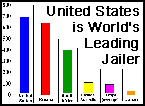Fast Track to Contaminated Water
by Martin Wagner
While the attention of most Americans is focused on issues of war and security, the Bush administration is working to conceal its trade agenda from the American people by pushing a "fast track" trade bill through the US Congress.
Fast track is an unusual process through which Congress gives away its constitutional authority to set trade policy. In the five times it's been used, fast track has enabled far-reaching trade deals, like NAFTA and the World Trade Organization, to be rushed through Congress without amendment or a fair hearing. Now, some are calling for a new fast track to approve a giant NAFTA expansion called the Free Trade Area of the Americas (FTAA). FTAA would create a trading block from the Arctic Circle to Tierra del Fuego, incorporating almost all the countries of the Western Hemisphere.
Californians may ask, "why should we care?" Well, we should care deeply, because our health, our environment and our scarce water resources are at risk.
Consider the case of Santa Monica. In 1996, Santa Monica's water supply was poisoned by MTBE, a chemical in gasoline that seeped into city wells and made the water undrinkable. A massive clean up was needed, the water system was shut down, and bottle water had to be shipped in. The primary problem posed by MTBE is contamination of ground and surface water. MTBE mixes quickly with water, and does not absorb into soil. As a result, when it comes into contact with water, either because of a gasoline spill, a leak from a boat engine, or a leak in a storage tank, MTBE spreads quickly. Once MTBE enters the ground or surface water, it is difficult to detect and costly to remove.
In response to this threat to California's water supply, Governor Davis ordered MTBE removed from gasoline by 2002, but that plan may be thwarted. The Canada-based Methanex Corporation, producer of one component of MTBE, is using expansive rights granted to foreign investors under NAFTA to demand the U.S. government pay one billion dollars - the amount of profit the company claims it would earn from MTBE sales - if California insists on banning the chemical.
Methanex's challenge is based on a provision in NAFTA that allows foreign corporations to sue for cash compensation from taxpayers for any federal, state or local measures that may interfere with corporate profits. Foreign investors have used these unprecedented NAFTA rules to challenge a variety of environmental and health laws, court decisions and even governmental provision of services in all three NAFTA countries. To date, more than 15 of these NAFTA cases have been filed and the damages sought from the taxpayers of NAFTA nations add up to more than $13 billion.
If you haven't heard about these NAFTA cases, it's no surprise. They are decided in secretive corporate arbitration tribunals. The proceedings are not open to public observation or input, and documents are difficult or impossible to obtain.
The secrecy extends to the US government as well. The United States has kept the public in the dark about its FTAA negotiating positions, while at the same time giving special briefings to industry representatives and making documents available to foreign negotiators.
California has long been a national and global leader in environmental and health protection. Our organic food laws and toxics regulations, like voter-approved Proposition 65, provide high levels of safety for our children and environment. These laws may not only be endangered by NAFTA corporate lawsuits, but similar rights for foreign investors are incorporated into the draft FTAA agreement. This promises an explosion of new cases, and we can be sure that California's cutting-edge environmental laws will be a prime target.
Fast track would set the terms of trade for the next decade. Approving fast track now is tantamount to approving FTAA in 2005. Americans should not let Congress abandon its responsibility to ensure that trade agreements protect our health and environment.
Martin Wagner is Director of the International Program for Earthjustice. He has sued the US Trade Representative for public access to the US negotiating position on FTAA and is pursuing legal channels for a public role in the Methanex case.
|

